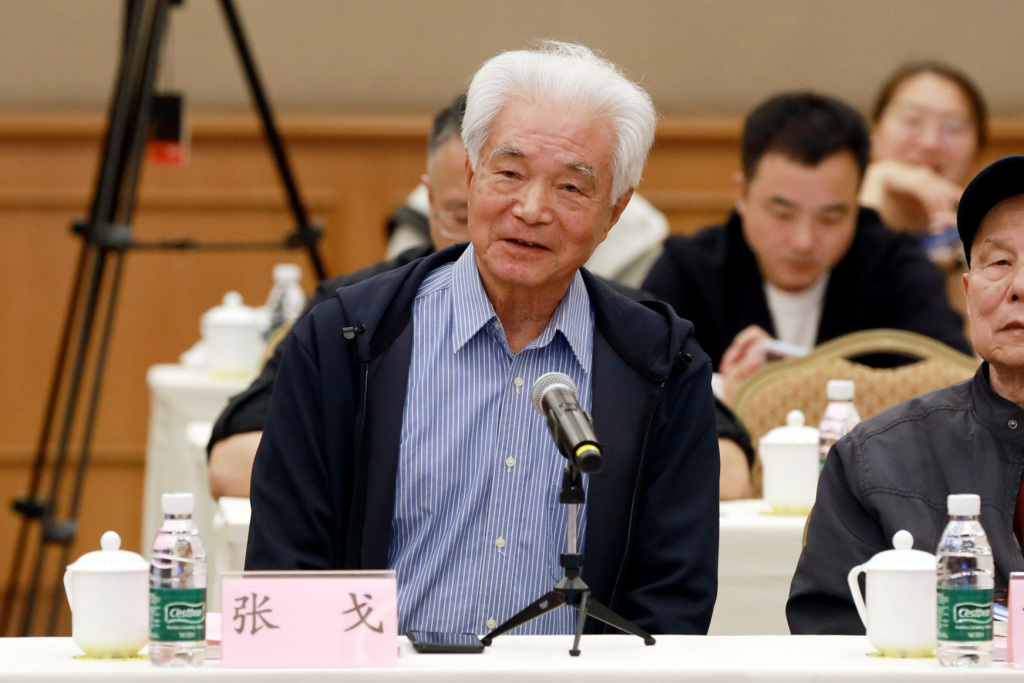
On October 23rd, 56 honorary membership medals were solemnly presented to veteran artists at the Shanghai Art and Culture Hall. At the symposium celebrating the 40th anniversary of the Shanghai Television Artists Association, this moment served as a vivid footnote to the association's 40 years of talent development. From fewer than 100 members at its founding in 1985 to its current "artistic family" of nearly 1,600 members, encompassing both veterans and young artists, the Shanghai Television Artists Association has spent four decades writing a vibrant chapter in the relay of television artist talent.

Medals and certificates of honor
"I was member No. 8 when the association was founded in 1985!" At the symposium that day, Zhang Ge, the fourth vice chairman of the Shanghai Television Association and a first-level director, said something that instantly brought the thoughts of those present back to forty years ago.
As the director of classic dramas like "Jigong" and "Shanghai Morning," Zhang Ge's creative career parallels the Shanghai Television Association's legacy of talent. He recalls that when he first received the script for "Jigong" in 1985, he hesitated to act due to its unconventional and fantastical subject matter. "I was afraid of stepping into 'off-limits,' and even hesitated to put my name on the screenwriter." It was Gong Xueping, then a leader of the Shanghai Television Association, who reassured him with the words, "Jigong is a good film, and the people will love it." The association not only helped him coordinate filming resources but also organized audience screenings and critics' seminars immediately after the series wrapped. "We invited reporters and ordinary audiences, and their feedback was incredibly insightful, like 'Can Jigong's robes be a little more torn?' 'Can the dialogue be more grounded?' These suggestions helped us refine the production." "Jigong" became a nationwide hit, and its theme song became a household name in Shanghai, becoming a part of the collective memory of a generation.

Zhang Ge, the fourth vice chairman of the Shanghai Television Association and a first-class director
The experience of creating "Shanghai Morning" made Zhang Ge deeply appreciate the association's commitment to "helping people get started and seeing them through." The series premiered in Shanghai in 1989 to enthusiastic response. CCTV, originally scheduled to air in November, withdrew due to some audience complaints. At the time, series not broadcast on CCTV were ineligible for national awards, and the team's hard work seemed to be wasted.
"I was so anxious I couldn't sleep. It was the TVA that stepped up and helped us organize a symposium with representatives from the All-China Federation of Trade Unions, the Women's Federation, and businesspeople, gathering feedback point by point." Zhang Ge explained that the TVA not only coordinated expert guidance on revisions but also connected him with the Beijing judging panel and even invited veteran Shanghai officials like Chen Peixian to screen the film for review. During the 1990 Spring Festival, the revised "Shanghai Morning" finally aired on CCTV-1 during prime time, winning numerous Feitian Awards, including Best Actor (Yan Xiang) and Best Actress (Li Yuanyuan). "The TVA isn't simply a 'manager,' but a mentor and friend to us creators, a bridge that passes on experience and resources to the next generation," Zhang Ge's words were met with unanimous nods from the veteran artists present.
This warmth of "seniors mentoring the younger generation" has also left a deep impression on Wang Liping, Vice Chairman of the China Television Association, Vice Chairman of the Shanghai Television Association, and a top-tier screenwriter. In 1999, Wang Liping arrived in Shanghai from out of town as a talent recruit. She was new to the unfamiliar city, with no acquaintances and unfamiliar with the creative environment. "Back then, Teacher Zhang Ge called me and said, 'Come to my house for dinner this weekend so we can talk about the script,'" Wang Liping recalled. Every weekend, she would take the subway to Xinzhuang Station and always find Teacher Zhang waiting at the exit. "At my house, his wife would prepare a table full of Shanghainese dishes, and Teacher Zhang would discuss the ins and outs of television writing—how to capture the details of Shanghainese life and how to imbue character dialogue with a Shanghainese flair. He would even lend me his own writing notes." Late at night, returning home, she and her husband would catch the last subway. The carriage was empty, but her heart was filled with warmth. "That feeling was like finding an 'artist' in a strange city, reassuring me that I wasn't working alone."
Today, Wang Liping has become a successor: Since 2014, she has spearheaded the monthly "Shanghai Film and Television Academic Salon," inviting veteran artists, young screenwriters, and directors to exchange creative insights. Over 100 events have been held to date, and many young creators have gained opportunities for script revisions and resource connections through the salons. "Inheritance isn't just a slogan; it's about passing on the warmth my predecessors brought me to younger generations," Wang Liping says.

Wang Liping, Vice Chairman of the China Television Association, Vice Chairman of the Shanghai Television Association, and First-Class Screenwriter
If the oral and heartfelt teachings of veteran artists are the "soft power" of inheritance, then the series of brand platforms established by the Shanghai Television Association are the "hard support" for talent development. Song Jiongming, Vice Chairman of the Shanghai Television Association and Deputy Director of Shanghai Radio and Television Station, said that the platforms established by the association not only help young talents "gild their image" but also help them "develop their skills." The association's "College Student Host Newcomer Competition" has expanded from Shanghai to the Yangtze River Delta region, the "Tomorrow's Anchor Training Camp" trains dozens of young anchors annually, and the "Short Video Competition" attracts tens of thousands of film and television companies and independent creators. "These platforms act like 'talent incubators,' allowing more talented young people to shine."
In the new era of media convergence, the Shanghai Television Association's talent inheritance has added a new dimension of "traditional experience + new technology." For example, the literary communication brand "Side Ear," co-founded by more than 30 news anchors, has pushed more than a thousand episodes of high-quality audio and video content in nine years, with over 6 million hits, and has also published six audiobooks. It has inherited the original intention of "serving the people" while expanding the boundaries of communication with new technologies. Yin Hairong, Vice Chairman of the Shanghai Television Association and Chief Announcer and Host of the Shanghai Radio and Television Media Convergence Center, said that the association will not only organize veteran anchors to provide "one-on-one" guidance to young anchors, but also regularly hold "new media creation training courses" and invite technical experts and platform operators to give lectures. "Only by connecting old experience with new technology can talents grow faster."

Yin Hairong, Vice Chairman of the Shanghai Television Association and Chief Announcer and Host of the Shanghai Radio and Television Media Center
As a representative of a member company, Yang Xiaopei, founder and CEO of Xixi Pictures, has also felt the association's support for young creative teams. Last year, Xixi Pictures' work, "Fireworks Family," was recommended by the association for the China Golden Eagle Awards, reaching the second round of reviews on its first attempt. This year, the association also invited them to co-host the "Walking with the Times" academic salon, focusing on "Period Drama Creation," giving the company's young screenwriters and directors the opportunity to connect face-to-face with industry veterans.
"Our company has many creators born after 1995. They are creative and full of ideas, but lack industry resources and creative experience." Yang Xiaopei said that the association not only helps them connect with veteran artists as "creative consultants", but also recommends them to participate in the "Shanghai-produced Drama Creation Support Program". "Next, we are going to shoot Shanghai-produced dramas such as "Beautiful Scenery" and "Shanghai Fireworks". The association has helped us contact Shanghai's old industrialists and businessmen and old neighbors to collect materials. These can help the young team take root in Shanghai better and tell Shanghai stories well."
Wang Zhaonan, executive director of the Shanghai Television Association and vice president of iQiyi, said that iQiyi also focused on the combination of "old traditions and new expressions" when creating Shanghai-produced dramas such as "The Road of Life" and "City within a City" - for example, "The Road of Life" was adapted from Lu Yao's classic literary work. The creative team not only inherited the realistic tradition of "recording the changes of the times and paying attention to the fate of ordinary people", but also used youthful lens language and character creation to make the story resonate with contemporary youth. "Many of the young screenwriters of this drama grew up through the association's "Young Screenwriter Support Program". They understand both classics and young people. This is the power of inheritance."
"Veteran artists are the 'living fossils' of Shanghai's television art. We must fully leverage their exemplary role and pass on their creative experience and artistic character. Young creators represent the future, and we must give them opportunities to shine, ensuring 'successors succeeding the masters.'" Pan Min, Deputy Director of the Publicity Department of the Shanghai Municipal Committee, stated at the symposium, clarifying the core direction of the Shanghai Television Association's talent development efforts. Yan Shaofei, Secretary of the Party Committee of the China Television Association, also expressed the hope that "we must further unite and gather together the vast majority of television and online audiovisual artists, including those in the 'new and emerging arts' sectors, especially young talent, strengthen professional ethics, foster a clean and upright creative environment, and truly build the Association into a broad, cohesive, and warm and harmonious home for artists."